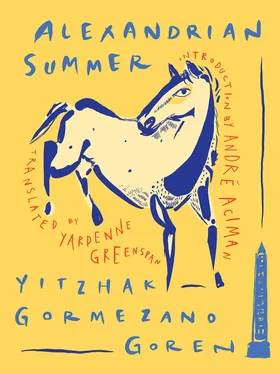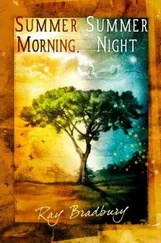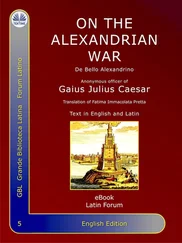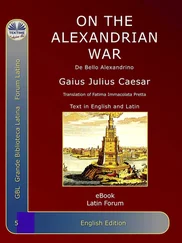Yitzhak Gormezano Goren
Alexandrian Summer
“And to every people after their language”
Book of Esther I: 22
ON DECEMBER 21, 1951, YITZHAK GORMEZANO GOREN, aged ten and accompanied by his parents, left his home on Rue Delta in Alexandria to rejoin his two brothers who had already moved to Israel. That the whole family decided to leave Egypt as early as 1951 shows that they had the uncanny prescience to read the writing on the wall long before most Egyptian Jews realized that their days in the country were numbered.
The military coup that was to overthrow King Farouk in 1952 and, with his ouster, eventually dissolve all remnants of multi-national life in Egypt, can only confirm the Gormezano Gorens’ sense that life as they’d known it in Alexandria was fast coming to an end. Surging anti-Western and anti-Semitic rhetoric on the streets and in radio broadcasts had turned Egypt into a tinderbox that was to explode with the Suez Canal War of 1956, a war that proved disastrous to Egypt’s European community. French and British nationals were instantly expelled, their exodus immediately followed by the expulsion of the majority of Egypt’s 85,000 Jews, most of whose ancestors had been living along the Nile and its Delta for more than a millennium and long before the advent of Islam.
Alexandrian Summer is a nostalgic, farewell portrait of a world that was fast expiring but still refused to see that history had written it off. The outward signs were deceptive enough to placate everyone’s worst fears: money, beaches, tennis, races, gambling, servants, friends, visits, outings, sugary delights; the whole fabric of day-to-day life smoothed over by that invigorating source of nattering called gossip, guile, and more gossip.
This, after all, was a multi-ethnic, multi-religious, multi-sexual, multi-everything society where Copt, Jew, Muslim, Catholic, and Greek Orthodox lived tolerably well together and where multilingualism was the order of the day. Everyone was part Levantine, part European, part Egyptian, and one hundred percent hodgepodge, just as everyone’s sentences were spiced with words and expressions lifted from French, Italian, Arabic, Ladino, Turkish, Greek, English, and whatever else came by. Tart-to-toxic bons mots in a mix of six to eight languages could singe you just enough to shake you up but without causing any damage. Similarly, the mix of populations was never perfect, and cultures and creeds jostled one another without scruple. There again, the tussling was amicable enough and never deadly. But no one was fooled for long. The peaceful coexistence of so many creeds and nationalities may have been asking too much of mankind and in the end was too good to be true. It never lasts; it never did.
But this is still summer, and as happens every year, hordes of Cairenes would descend upon Alexandria to summer there. The host family and their guest family go back years together. The son of one family is a jockey who hopes to win on the racetrack, while the daughter of the other family asks him to choose between her and horses. She tempts him at the beach with her body, but the young man resists, only to end up being taken to a brothel by his father. Meanwhile, his younger brother is a compulsive sex machine who’ll undress for any boy who so much as cuddles up to him. There are many more characters, each one, in the end, destined to spar with the other, even when there’s something like love or not quite love between them. Nothing is ever perfect. In the end nothing could patch up the billowy screen that unbeknownst to everyone was fast being ripped apart.
Things could get worse. When a Jewish jockey wins the summer’s race against a Muslim, a virulent fever of anti-Semitism erupts upon the city, and Alexandria is almost ready to burst into flames. Anti-Semitism is brutal and ugly, but Gormezano Goren is by no means unaware that the contemptuous treatment of Arabs, particularly of Arab servants in Jewish and European households, is no less disquieting a harbinger of Muslim unrest and rage. A servant should never stop to think that a Jewish boy’s toy train could cost seven times what he earns to feed his kids each month.
This striking example highlights Gormezano Goren’s light touch whenever seeking to convey the resentment and bitterness forever brewing beneath the surface in Muslim-Jewish relations. In another passage, he nimbly demonstrates how combustible were the dealings between both groups by showing what happens when an Egyptian jockey accuses his Jewish competitor of drugging his racehorse. Mass hysteria could easily erupt. These are small, incidental observations but they speak volumes. Ultimately, in a world being scuttled far too quickly for anyone to gauge the extent of the damaged relations between Arabs and Jews, Gormezano Goren’s words are as prophetic as they are disturbing: “Times have changed, and Jews have changed.”
Alexandrian Summer is not so much the story of a peculiar culture or of a particular class or even of a specific moment in history. It is the story of what could only be called a “way of life”—an altogether unquantifiable and elusive term that conveys only a fraction of what life was like for the Jews of Egypt. Every day was lived as if it were the last. What came after Egypt was fantasy and fear.
I knew that way of life well. I was born into it on the very year Yitzhak left Alexandria. That way of life lasted another fifteen years until my Jewish family too was expelled from Egypt. I knew the beaches, I knew the taste of special foods, I knew the scent of clothes drying in the sun. And I knew Rue Delta, since I too lived on that street. It is on Rue Delta that I spent my last night in Alexandria. Our house, like the Gormezano Gorens’, was located midway between the beach and the racetrack. I too have watched the races and walked from the races to the beach and from the beach to the races.
In my long years away, I have met others who had lived on Rue Delta. I have even met someone whom I did not know in Alexandria but with whom it came as a total surprise to discover that the two of us had grown up in the identical building. At first, I found it hard to believe, and in the café where we met that first time, I asked her to map out the layout of her parents’ apartment on a paper napkin. Hers seemed totally wrong. It couldn’t possibly have been the same building. But then it suddenly hit me that she was not wrong at all; her apartment was identical to ours except that hers had the exact, but reverse layout. What luck, I thought. Everything seemed settled … except for a round room. I asked her if her apartment had a round room in the back. No, theirs didn’t have such a room. But then she thought about it, gave out a sudden cry, and had an epiphany. Yes, theirs did have a round room and she knew its precise spot. It was just that she hadn’t thought of that room in over sixty years! No one used that room, no one lived in it. In both our cases it had become a storage, bric-a-brac space. And as we described that room to each other, we could almost make out the moldy, woody smell of the space, which in her family’s, as in ours, was the last stop for dead chairs and defunct cabinets and chests of drawers.
Alexandrian Summer is a return to a mythical past, to a lost paradise that was not really a paradise but that, being lost, has, over the years, acquired all the makings of one. One’s childhood is always yearned for, and this is young Yitzhak’s — or Robert, as he is called in the book — paradise.
I still remember our last year in Alexandria. By then, our assets had been frozen and my father’s factory nationalized, and even our cars were no longer ours, though we were allowed to drive them. Our days were numbered, and we knew it.
Читать дальше












